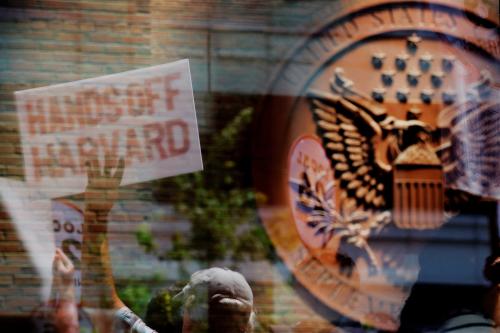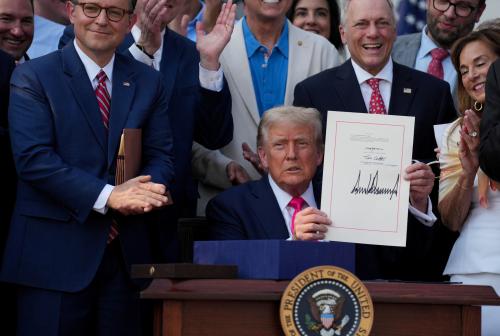For the past two decades, as public discontent has risen, elected leaders in Washington have failed either to enforce or to update our obsolete immigration laws. Donald Trump rode the issue to his improbable victory in 2016. Eight years later, President Biden’s failure to control immigration at the United States’ southern border generated a massive public backlash. By July of 2024, 55% of surveyed Americans wanted immigration to be reduced, 53% supported building a wall along the U.S.-Mexico border, and nearly half wanted all immigrants who entered the U.S. illegally to be deported, regardless of their work history and conduct while in the United States. Former President Trump highlighted immigration during his 2024 campaign, and post-election surveys showed that it had contributed significantly to his comeback victory over Kamala Harris, who failed to put any daylight between her approach to immigration and Biden’s unpopular policies.
Unsurprisingly, Trump began his second term with majority support for his get-tough policies. But now, less than seven months later, a majority disapproves of his record on immigration, and overall attitudes about immigration have made a U-turn. Support for decreasing immigration has fallen by nearly half, to just 30%, and a record-high 79% now consider immigration to be good for the country. This has happened despite broad support for the president’s actions to close the southern border—and for cooperation between federal and local officials to enforce immigration laws, which Democrats often resist.
What happened?
Let’s begin with general attitudes. According to polling by The Economist/YouGov from July 11 to 14, 2025, 52% percent of Americans think that President Trump’s approach to immigration has been “too harsh,” compared to 36% who think it has been “about right.” Similarly, 54% say that in enforcing immigration laws, ICE agents have gone “too far,” while only 27% say that their actions are “about right.” Four years ago, a majority of Americans thought that former President Biden wasn’t tough enough in dealing with immigration; now they believe that President Trump has made the opposite mistake.
Backing up these overall negative impressions are procedural objections to the way the Trump administration is carrying out its policies.
- Americans believe that the administration has been moving too quickly—and making numerous mistakes by not being careful enough.
- They disapprove of ICE agents wearing masks—and not wearing uniforms—during their raids.
- They do not like the way the Trump administration is using detention facilities, especially the Florida detention center known as “Alligator Alcatraz,” which is built in wetlands surrounded by alligators and crocodiles, and they believe that immigrants in these facilities are being treated too harshly.
- They believe that immigrants should have the right to challenge their deportation in court, and they oppose deporting immigrants who entered the U.S. illegally to countries where they are not citizens.
In addition, Americans believe that the Trump administration’s policies have been overly broad and have failed to make distinctions they think are important. They say that the administration is trying to deport more people than they expected and is no longer giving priority to dangerous criminal aliens. They think that Hispanic people are being unfairly singled out for deportation searches. They oppose both conducting immigration raids in workplaces and deporting immigrants who have not committed crimes while present in the United States.
Finally, majorities of Americans question the attitudes that underlie Trump’s immigration policy. Sixty-four percent say that America’s openness to people from all over the world is essential to who we are as a nation, compared to 35% who say that this openness is a threat to our national identity. Only 25% believe that “illegal immigrants” take jobs that Americans want, compared to 57% who believe that these immigrants take jobs that Americans don’t want to do. Majorities oppose deporting “illegal immigrants” doing jobs that are essential to large sectors of the economy, such as agriculture and food service.
Notably, support for Trump’s immigration policy has been especially weak among the groups in which he made the greatest gains last November. While overall support for this policy stands at 45% in a recent survey that closely tracks the national average, it is 37% among moderate voters, 35% among Independents, 33% among Hispanic people, and 30% among young adults ages 18 to 29. While 52% of Americans think that the president’s policies are too harsh, this figure rises to 57% for Independents, 60% for moderates, 61% for Hispanic people, and 65% for young adults.
Immigration has helped Republicans in recent elections. But unless Trump takes steps to make his policies more acceptable to voters outside his MAGA base, he and his party will find it hard to repeat these successes.
The Brookings Institution is committed to quality, independence, and impact.
We are supported by a diverse array of funders. In line with our values and policies, each Brookings publication represents the sole views of its author(s).








Commentary
Americans are changing their minds about Trump’s immigration policies
July 29, 2025